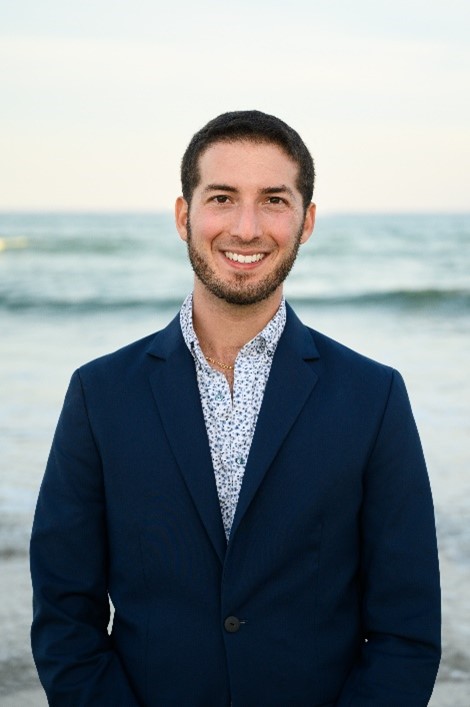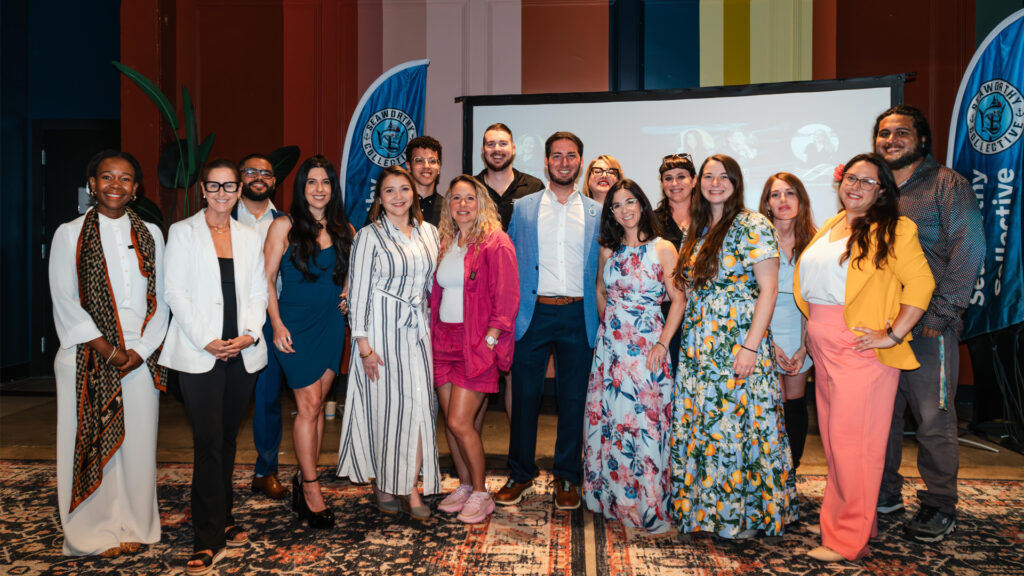By Megan Mascheri, FAU Center for Environmental Studies
The following Q&A was conducted with Daniel Kleinman, the founder and CEO of Seaworthy Collective. Seaworthy Collective is a Miami-based nonprofit organization that supports entrepreneurs in “blue tech” — technology and innovations related to marine and aquatic environments. This interview has been edited for length and clarity.
What motivated you to start this climate-conscious entrepreneurial support system?

My background actually is in marine robotics as well as design and systems thinking. I spent five years working at Woods Hole Oceanographic Institution, (then went) to an MIT spinout and then worked for the Navy. I did piloting, testing and design of unmanned underwater vehicles or underwater drones or submarines. Basically, my passion has always obviously been for creating impact.
Very quickly I saw how my career prospects got very siloed to working in the defense industry. … I saw that you could spend five years working on all different sides of marine robotics and still not have an opportunity to make an impact. … My experience is a microcosm of a lot of the barriers to participation and opportunity in the space, but even within the traditional green science spaces, (they’re) primarily leading people to career paths in academia or in the public sector. And the reality is there are more degrees than (there) are jobs in those spaces. …
What are these alternative pathways that not only can fulfill our passions, but even make us more money and really create scalable impact that moves faster? It’s all these things that are not only challenging the status quo, but really enabling us to achieve our personal and environmental missions faster and better and at scale, which is a key word for us to solve these massive challenges facing our oceans and planet.
How would you describe the concept of “blue tech” to the average person that may not be familiar with it?
The “why” behind Seaworthy, really, was to make blue tech and ocean and climate impact innovation accessible. And honestly, when we first started, I shied away from using the term “tech” because I didn’t want to be too jargony. … And so, my formal definition is ocean and climate impact innovation … If you simplify it to the overarching umbrella of “climate tech,” it’s everything on land. Everything on water is blue (tech).
One of my favorite things to say about our work is when it comes to climate change, we’re terrestrially biased — focused on leveraging land-based solutions, which is less than 30% of the planet to try to solve a global problem, climate change. The oceans are our biggest absorber of heat and carbon, and we have to put that to work if we’re going to solve these big problems.
What are some of the startups that we can look forward to seeing more of?
Out of the now 33 startups and 67 entrepreneurs we’ve supported, 67% have come from underrepresented backgrounds, female or minority entrepreneurs. This is the big milestone of this cohort and it’s the fact that this is the first majority female founder cohort … Gender equity in general was a very far-off concept from my experience in the private sector. So, you see us actually able to show that it’s not only possible but (represented in) this cohort. We had over a hundred organizations apply and these founders out-competed people from all over the world to get our support. …
In the first two cohorts we supported, which were 2021 and 2022, each of them (had) maybe 20% to 30% local or regional representation. … Our third and fourth cohorts have been the first time that it’s also been majority local. … We have seven startups in this cohort. … We worked across three different impact areas: pollution (upstream and downstream, and plastic), resilience and adaptation, and greenhouse gas reduction and removal. …

Green Thumb Strategies: Phytoflora (is developing) productive floating wetlands. The idea of floating wetlands for addressing pollution has been a solution for a long time, but it hasn’t necessarily been scaled up. … What (founder Jazmin Locke-Rodriguez) is doing is actually turning these wetlands into something productive in terms of creating the opportunity to grow flowers and crops on all these wetlands. …
The next one is Igugu Global. Igugu are Miami based. Their founder is Anele Bloch and she’s working on even higher-level work in blue finance and specifically enabling Africa. It’s sustainable investment infrastructure and funding for Africa. … The next one is also a local startup, Sargassum Eco Lumber. They are basically taking on deforestation but instead of sourcing lumber from trees, (they are) combining marine plastics and sargassum into raw wood planks that they can use for a variety of applications.
The next local startup is called StrawFish. That’s led by Kyle Lansing and he’s actually an alumni from FAU. And they’re creating biodegradable alternatives to single-use plastics, primarily straws, but they’re looking to expand into cups and they’re really impressive. They have a lot of great distribution all the way to the Sphere in Vegas. …
That’s all the local startups and then the three additional startups are from elsewhere. The first one is from elsewhere is CASTUS AI or CASTUS Technologies. They’re using AI and satellite data to actually help track and locate marine debris on the ocean surface. Any floating object, (they) can track and locate it.
There are so many applications. Obviously, plastic is usually the first thing that comes to mind with marine debris and helping cleanup operations but think about shipping. You lose lots of cargo that you see even in unfortunate incidents … when a plane goes down. Maybe they can help find planes faster, rather than my old colleagues who would go out for weeks searching using an underwater drone hoping to find a debris field. …
The second-to-last one is Coastal Protection Solutions and they’re up in Boston. And they’re basically creating these Wavebreakers that not only help to mitigate storm surge but also actually create alternative energy. They actually provide a micro grid, which in the event of a major hurricane is really valuable because people can still have access to power. Alex (Berkowitz), the founder, she’s really just an inspirational role model because we say the future is interdisciplinary and she’s literally a former chef who, after her hometown in Long Island got hit by Hurricane Sandy, decided to totally pivot their career toward climate. …
The last one is the Upwelling Institute. They’re based in Oakland and they are doing artificial upwellings … There’s a lot of focus on reef restoration, but the idea is that marine heat waves are obviously one of the biggest threats and on one hand, we can try to restore coral in the lab and try to breed the most resistant ones, but the other side is we could actually help leverage natural processes like upwelling to cool the ecosystems and maintain them. …
So that’s all seven and we’re excited for them to share all their progress. We’ve been in the thick of finishing their pitch decks and making sure they’re ready to go for startup (funding), but they’ve put in the work and it’s going to show.
This Q&A was conducted by Megan Mascheri, a graduate research assistant at Florida Atlantic University who is pursuing a master’s degree in its geosciences program. She has worked as a research assistant for FAU’s Center for Environmental Studies since 2021. The center manages and funds The Invading Sea.
Sign up for The Invading Sea newsletter by visiting here. If you are interested in submitting an opinion piece to The Invading Sea, email Editor Nathan Crabbe at ncrabbe@fau.edu.



